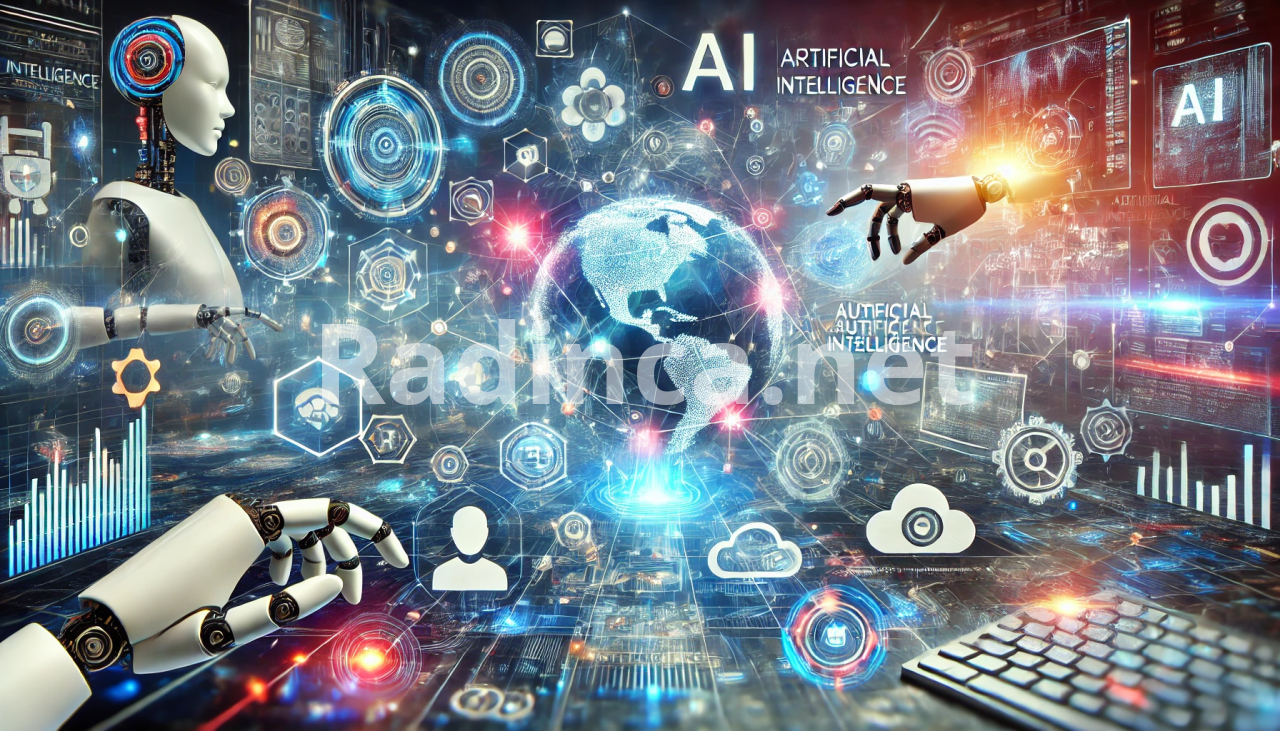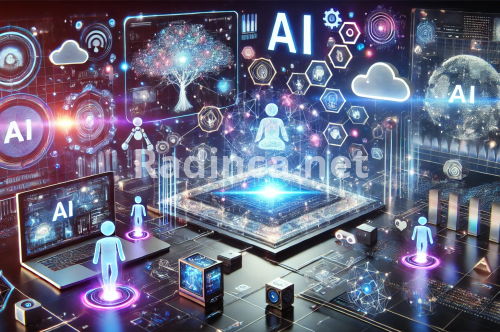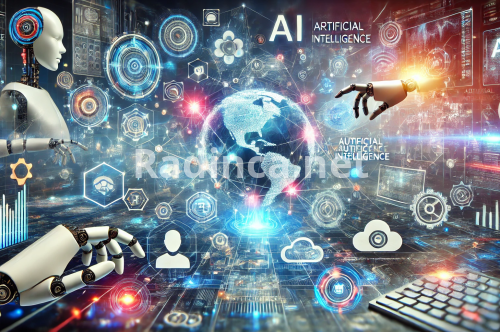Is AI Taking Over the Internet? A Deep Dive into the AI Revolution

Is AI Taking Over the Internet?
Artificial Intelligence (AI) has rapidly evolved from being a futuristic concept to a critical part of our everyday lives. From chatbots answering customer queries to AI-generated content flooding social media platforms, AI's influence on the internet is undeniable. The question now arises: Is AI taking over the internet? While AI presents unprecedented opportunities for businesses and individuals, it also raises ethical, economic, and existential concerns. This article explores the impact of AI on the internet and its profound implications for the future.
The Growing Role of AI on the Internet
The internet, as a global information hub, has become AI's primary playground. AI has infiltrated various facets of the digital space, including:
1. Search Engines and Personalized Search Results
Search engines such as Google, Bing, and DuckDuckGo rely on AI to refine search results and improve user experience. AI algorithms analyze search intent, location, browsing history, and patterns to personalize search outcomes. Tools like RankBrain and BERT (Bidirectional Encoder Representations from Transformers) help Google deliver highly relevant search results by understanding context, semantics, and user intent.
While this enhances user experience, it also reinforces a new reality—AI determines what information is most visible. Consequently, businesses and content creators must optimize their content for these AI systems, often at the cost of organic discovery.
2. AI in Content Creation
The proliferation of AI-generated content is one of the clearest indicators of AI’s influence on the internet. Tools like ChatGPT, Jasper, and Copy.ai are revolutionizing content creation by generating articles, marketing copy, social media posts, and even poetry.
AI content generation offers benefits like speed, scalability, and cost efficiency. For businesses, AI tools allow for:
- Quick production of engaging blog posts and marketing materials.
- Real-time personalization of website content for visitors.
- Streamlining creative tasks such as video scripts or graphic design prompts.
However, the downside lies in concerns over originality, quality, and misinformation. The ease of generating AI content increases the likelihood of “content pollution,” where low-quality or unverified content floods the internet, diluting genuine human creativity.
3. Automation of Customer Interaction
Customer service has been transformed by AI-powered chatbots and virtual assistants. AI chatbots provide 24/7 support for users, helping businesses scale their customer service operations efficiently.
For instance:
- E-commerce platforms use AI chatbots to answer product queries and guide purchases.
- Banks employ AI systems to address common account-related questions and fraud detection.
- Social media platforms rely on AI to automate responses and filter abusive or harmful content.
While AI improves response times and reduces costs, it also poses challenges such as a lack of empathy and an inability to handle complex customer issues effectively. Additionally, reliance on AI risks displacing human jobs in customer service sectors.
How AI Shapes Social Media
Social media platforms like Facebook, Instagram, TikTok, and Twitter use AI algorithms to curate content, target ads, and detect harmful activities.
1. Content Curation and Algorithmic Feeds
AI determines what posts appear on a user’s feed, prioritizing content based on engagement metrics, preferences, and behavioral data. Platforms employ recommendation systems to keep users scrolling, clicking, and sharing.
The upside? AI enhances user engagement by presenting highly relevant and personalized content. The downside? Filter bubbles and echo chambers can limit exposure to diverse perspectives, promoting polarization and misinformation.
2. AI-Driven Advertising
Social media advertising has become incredibly efficient due to AI. Marketers leverage AI to analyze demographics, interests, and user data to deliver tailored ads with high conversion potential.
Yet, this level of precision has also sparked debates about privacy. AI systems often require access to vast amounts of personal data, raising concerns about how this data is stored, analyzed, and used.
3. AI Moderation and Content Regulation
Platforms use AI to detect and remove harmful content, such as hate speech, misinformation, and explicit material. While AI moderation is faster than manual moderation, it isn’t perfect. False positives and negatives are common, and AI struggles with understanding the context or tone of nuanced content.
The Economic and Ethical Implications of AI Dominance
The rise of AI has broader consequences beyond its functional benefits.
1. Job Displacement and the Rise of Automation
AI’s ability to automate tasks has increased efficiency but at the cost of human jobs. Content creators, customer service representatives, and data analysts face significant challenges as AI systems perform these roles faster and more cost-effectively.
For example:
- Automated tools replace writers with AI-generated blog posts.
- Designers face competition from AI tools like MidJourney and Canva AI.
- Video editors compete with AI-powered video production tools.
2. Bias and Misinformation
AI systems are not immune to bias. They inherit biases from training datasets, leading to skewed recommendations, unfair decisions, or discriminatory practices. For instance, biased AI algorithms have been criticized for reinforcing stereotypes in hiring practices, criminal justice systems, and search engine results.
AI-generated misinformation is another pressing issue. Deepfake videos, AI-written fake news, and manipulated images can spread rapidly, affecting public trust and creating social chaos.
3. Data Privacy and Security
The internet relies heavily on data, and AI depends on this data for training and analysis. However, data privacy becomes a serious concern when AI tools gather user information without transparency.
- How secure is user data?
- Who owns the data fed into AI systems?
AI’s dominance on the internet necessitates stricter data privacy regulations to protect individuals from exploitation.
Is AI Truly Taking Over the Internet?
The answer depends on how one defines “taking over.” AI has undoubtedly reshaped the internet landscape by improving efficiency, enabling automation, and enhancing user experiences. From search engines to social media algorithms, AI drives the modern internet’s functioning.
However, AI does not operate in isolation. Human oversight remains crucial in developing ethical frameworks, maintaining transparency, and mitigating unintended consequences.
1. Collaboration Between Humans and AI
Rather than replacing humans entirely, the future of the internet may focus on collaboration between AI and human intelligence. For example:
- Writers can use AI tools for brainstorming, grammar checks, and drafts but add a unique human touch to content.
- Marketers can leverage AI data analysis while ensuring campaigns remain creative and audience-centric.
2. Ethical AI Development
Tech companies and policymakers must prioritize ethical AI development, emphasizing fairness, accountability, and transparency.
Regulations such as the European Union’s AI Act aim to ensure responsible AI usage while mitigating risks associated with privacy, security, and misinformation.
Conclusion
AI is undoubtedly transforming the internet, influencing how we search, consume, create, and interact with content. While it brings unprecedented opportunities for efficiency and innovation, it also poses challenges like job displacement, misinformation, and data privacy concerns.
AI’s growing presence is less about “taking over” and more about creating a new digital ecosystem. The challenge lies in striking a balance—leveraging AI’s capabilities while ensuring ethical, human-centered practices guide its use. The future of the internet isn’t AI alone; it’s AI and humanity working together.
 English
English Spanish
Spanish



MBWUpmEH
1
5 months ago
TWSfSopc
1
5 months ago